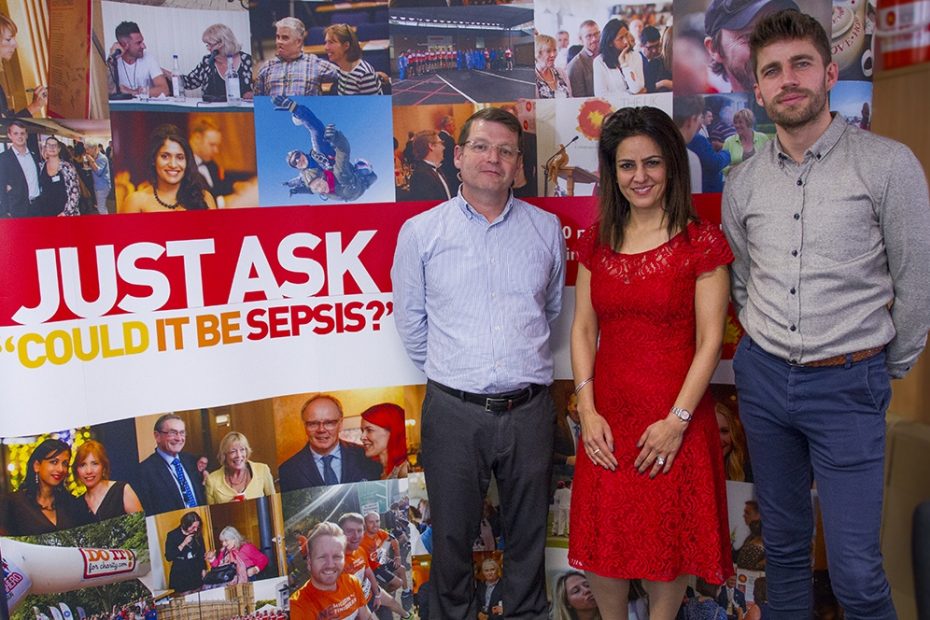Oberoi Partners Sepsis Helpline

The life-threatening condition of sepsis is never far from the news headlines at the moment, even featuring in a high-profile storyline in Coronation Street in July this year.
Medically, it is the body’s immune system over-responding to an infection and survivors can suffer from lasting consequences, both physical and psychological. These include debilitating fatigue, poor mobility, muscle weakness, hair loss, breathlessness, depression, pain in the muscles joints and nerves and even loss of limbs, as Jack Webster does in the long-running soap.
Recovery commonly takes six to eighteen months and is poorly understood, with many sepsis survivors being discharged from hospital with little or no information on what to expect.
The UK Sepsis Trust Sepsis Helpline is a much-needed helpline at times like this and run by the Charity The UK Sepsis Trust.
Ron Daniels, CEO of the charity, approached Kavita Oberoi OBE and the team at Oberoi Business Hub to manage overflow calls for them when the Coronation Street Story broke earlier this year in order to provide greater reach to viewers that may call as a result of the story.
Kavita said: “It has been a big responsibility for the team to be taking such sensitive calls as callers are often distressed and need to reach out to talk to someone. Usually at the Oberoi Hub, it’s businesses that we support rather than charities and patients, this has been a very different but rewarding experience for the entire team”.
It’s a 24 hours a day, seven days a week service, initially it was going to be for a short amount of time during the storyline but it’s proved to be invaluable to the clinical support teams and the charity”.
Oberoi are the point of contact for callers if the support nurses are unavailable or busy, a message is then relayed with the information taken for a return call with the Healthcare professionals.
The helpline is an essential part of the support the charity provides to many patients and families that have been affected by sepsis. Trained nurses who have many years of experience in working in critical care and caring for patients and families affected by sepsis support the helpline.
They have an excellent knowledge of some of the problems that can be experienced after getting sepsis.
Chatting with a support nurse and gaining an understanding of what is normal during recovery and getting some advice on how to manage symptoms helps to make the road to recovery a much easier journey, as well as empowering the survivor of sepsis to manage their recovery more effectively.
Ron said: “For many survivors who call the helpline, it is the first opportunity to discuss what has happened to them and to ask about some of the problems they are now experiencing. Being able to talk things through and ask questions can be immensely beneficial.
The support team also provide initial bereavement support. Sepsis can take loved ones from us quickly an unexpectedly. Often loved ones who are left behind have many unanswered questions or would just like to talk about what happened to someone who understands sepsis. The support nurse can help those left behind understand what happened and answer some of their questions. If needed the caller can be signposted to specialist bereavement counselling services.”
He added: “Having the 24/7 availability is hugely beneficial for several reasons. Many callers to the helpline have to pluck up a lot of courage to call, having a response from an answer machine can be impersonal, callers are often upset and feel unable leave a message. They may not always muster the courage again to call back later.
“It also provides immediate response from a sympathetic listening ear, while waiting for a call back from a support nurse and the caller can be signposted to appropriate information on The Sepsis Trust website.”
Callers who are distressed are prioritised for return calls and callers who do not require a call back from a support nurse are sign posted to the relevant personnel.
Larry Matthews, support lead, fed back that he was delighted with the service, on one occasion he had spoken to a caller who has been supported by Oberoi’s team.
He said: “When she called she was very distressed and feeling desperate, but she said she was very grateful to the first team member who handled her call. They were sympathetic, she felt listened to and they did an excellent job of calming her down.”
Kavita added “The most rewarding part of the Oberoi team providing the support is knowing that we are making a small but significant difference to those affected by Sepsis”
